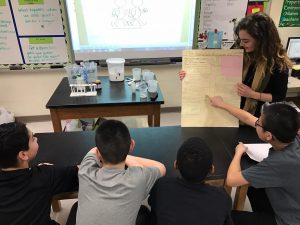Resources for Identifying Phenomena
Qualities of a Good Anchor Phenomenon for a Coherent Sequence of Science Lessons
Heuristic for identifying Phenomena
Using Phenomena in NGSS-Designed Lessons and Units
How to Come Up With an Engaging Phenomenon to Anchor a Unit
Resources for Supporting Equitable Three-Dimensional Learning
Overview: How can we promote equity in science education?
How can formative assessment support culturally responsive argumentation in a classroom community?
How can I promote equitable sensemaking by setting expectations for multiple perspectives?
Supporting Language Learners
Engaging English Learners in the Science and Engineering Practices
How to design assessments for emerging bilingual students
Myths about English Language Learning
No Puedo: Assisting Spanglish-Speaking Students in the Science Classroom
Resources for Addressing NGSS/Framework Implementation Challenges
Project Sing Implementation Tools
Resources for Planning and Facilitating NGSS/Framework Instruction
**High School Biology Course (modelbasedbiology.com)**
Next Generation Science Storylines
Incorporating Science Talk in Modeling Activities
How Can I Get My Students to Learn Science by Productively Talking with Each Other?
How can teachers guide classroom conversations to support students’ science learning?
Examples of Quality NGSS Design (Including Units)
NGSS/Framework Assessment Resources
Developing Assessments for NGSS
Steps to Designing a Three Dimensional Assessment
Integrating Science Practices Into Assessment Tasks
Prompts for Integrating Crosscutting Concepts Into Assessment and Instruction
Research Brief: The Informal Formative Assessment Cycle as a Model for Teacher Practice
How teachers can develop formative assessments that fit a three-dimensional view of science learning
Research Brief: Designing an Assessment System that Measures Three-Dimensional Science Learning
Next Generation Science Assessments
Short Course: How to Develop 3D Formative Assessments for the Science Classroom
ACESSE Resource A – Introduction to Formative Assessment toSupport Equitable 3D Instruction
Three Dimensional Science Performance Assessments
Resources for Assessing NGSS Materials
Evaluating Curriculum Materials for Alignment with the New Vision for K-12 Science Education
Resources Supportive of District NGSS Implementation
NGSS District Implementation Workbook
Resources for Communicating About the NGSS/Framework
NGSS Overview and Resources for Principals
What school building administrators should know about the new vision for K-12 science education
Resources for Supporting Preservice Teachers, Mentor Teachers, University Science Educators
How can mentor teachers and university educators support preservice science teachers?
Additional STEM Resources
PD Readings
What we call misconceptions may be necessary stepping stones toward making sense of the world
Collaborative Team Project Norms
Resource Perspective as a Model of Cognition (Shopping for Ideas)

